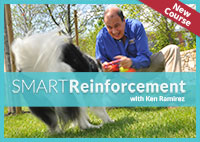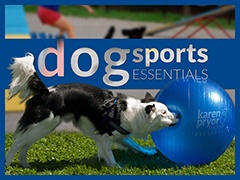We avoided the whole subject of getting a dog for a long time. There were good reasons not to get a dog: we can't because we're moving, because we will be in a rental, we don't have the time. But logic lost, "Angel" won, and an adorable puppy joined our family.
We began to learn about raising a puppy. At two months we clicker trained "sit" and to not snap the treat out of your hand. Angel is an energetic dog, bright and very attentive, with a healthy dose of cattle dog in her heritage—a little aggressive, like her mother who was wild and had the pups in a burro she dug herself.
So, as we loaded up for a trip from Bakersfield, California, to ClickerExpo in San Diego, we were not only eager to see Karen Pryor and to experience our first Expo, but we felt a little desperate to bring home some secret to house training, which we were obviously failing at, and to find better ways to include our kids in the process of domesticating our newest family member. (Of course dogs have been domesticating humans for millennia, and are as excited about new ways to train their humans as we are.)
We arrived Saturday mid-session and sat in on the shelter group. Karen was lecturing and working with a rowdy jumper from a local shelter and showing clips from work with shelter cats. She began shaping a variety of behaviors. Sitting, eye contact—anything worthwhile was clicked, any movement even sort-of worthwhile was reinforced and the dog responded positively to the game. (This was new for me. I had always picked a single behavior and worked it to death.) With so many animals in desperate need of homes, this particular application seems profoundly important.
As the session ended, the doors opened and hundreds of people and dogs filled the halls. The ambiance was full of smiles, inquisitive conversations, and friendliness that a golden retriever could relate to. There were many new products available from numerous vendors, and many helpful volunteers and staff made sure everyone had what they we looking for. Even with nearly 400 dogs staying at the Hilton, we never heard a harsh growl exchanged. Everyone behaved extremely well (and the dogs were good too). There was even a coned-off area in the parking lot, covered with real grass turf, for the animals' convenience. Over all, the whole event was very well organized, it seemed, and was easy to integrate into.
The information and demonstrations at ClickerExpo can humble the most professional dog trainers and empower the most inexperienced. An honest woman on the elevator stated "I'm a professional dog trainer, but when I go to these things I feel like I don‘t know anything!" Well, even the speakers are quick to say they don't have all the answers and that they are part of this lifelong learning curve. So many of the speakers' points were life lessons that extended beyond dog training and spilled over to my world of instructing 8-year-olds in school. Both our 16-week-old puppy and my 20 second-grade students will be the recipients of these valued reminders: be keen observers of what is going right; success can be broken down into small pieces that build/reward the process, not just the product; be learner focused—the learner going away feeling successful is the goal because confident learners are eager for more (at an 80% failure rate, anyone will shut down).
We left San Diego eager to try some of the things we had seen, to shape a broader spectrum of behaviors in our Angel and at the same time resolved to let her become who she is and not try to make a shepherd into a poodle or visa versa. Angel can be the cattle dog she is and learn a few manners too.
And now, a couple of weeks later, we find we are pulling out the clicker more, Angel is asking to go outside (CLICK!) and we all seem a bit relieved (no pun intended). This field is so cutting-edge that sometimes a clicker trainer is the only one who understands the passion and the optimism—that even dogs pooping in the house can be positive: "She‘s pooping closer to the door now!"







Is 8 weeks too young?
Today we just picked up our new chocolate lab putty. She is 8 weeks old today. She seems so small, is this too young to start with the Clicker?
Never too young or too old!
No she is definitely not too young! Pups as young as 4 weeks can start; clicker training is so gentle and effective, even young and old dogs can learn with great results! Enjoy your new pup and kudos for considering a humane, effective, reliable way to train!
Post new comment